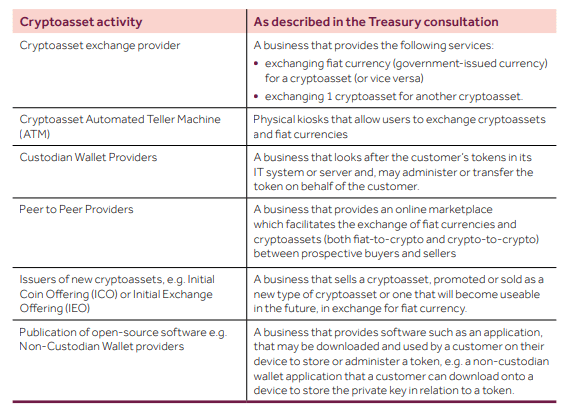FCA takes on AML supervision for Cryptoassets sector
What’s happening?
The EU’s Fifth Money Laundering Directive (5MLD) comes into force on 10 January 2020. In anticipation of the changes this will bring, the Treasury has charged the FCA with AML supervision of cryptoassets firms’ anti-money laundering policies and procedures.
The FCA’s Anti-Money Laundering and Counter Terrorism Finance (AML/CTF) responsibilities in relation to UK cryptoasset businesses will be limited to AML/CTF registration and supervision. Its remit covers supervising and taking any necessary enforcement action against UK cryptoassets businesses, whether or not they are FCA registered.
As the FCA’s Guidance on Cryptoassets set out in Policy Statement PS19/22 makes clear, some businesses that engage in cryptoassets-related activity require FCA authorisation for non-cryptoasset activities under regulations such as the Financial Services and Markets Act 2000 (FSMA). But, from January, all UK businesses involved in cryptoassets-related activity need to be registered with the FCA for AML supervision.
Registration
The FCA now expects that:
- Cryptoassets firms will have applied to be registered for AML/CTF purposes before 10 January 2020 (this specifically includes those already registered or authorised for other activities)
- Any new business that intends to carry on cryptoassets-related activities after the 10th of January 2020 must obtain FCA registration before doing so
- Any business that has previously been carrying on cryptoassets-related activities may only continue to do so (in compliance with the MLRs) if it has registered by the 10th of January 2021
Application of the regulations (scope to be finalised):
The Treasury report following its consultation on the Transposition of the Fifth Money Laundering Directive stipulates that the FCA’s responsibilities will cover the cryptoassets-related activities specified in 5MLD, as well as a wider range of other activities recommended by the Financial Action Task Force as set out below:

If your firm conducts any of the activities mentioned above, you’ll need to consider your AML procedures in line with guidance published by Joint Money Laundering Steering Group (JMLSG) and the FCA.
Process
To register with the FCA for cryptoassets supervision, you must:
- Complete the online application form (which you can find on Connect)
- Provide the FCA with the information they request, and
- Pay the registration fee
Regardless of the FCA’s registration timeline, you will need to comply with your obligations under MLR from 10th of January 2020.
When applying for registration, you should consider the following:
- Bear in mind that the FCA may request further information after receiving your application
- To avoid your application being delayed or rejected, you should notify the FCA immediately of any changes
- Your application only becomes complete once the registration fee has been paid (no decision will be issued unless and until that happens)
- the FCA is encouraging businesses to send their applications early to ensure they meet the registration deadline
Fees
- A one-off registration fee of £5,000, paid both by businesses already authorised and by new registrants, plus
- Annual periodic fees, based on income
Annual fees will be calculated in a similar way to assigned periodic fees. The FCA aims to recover its ongoing regulatory costs by grouping fee-payers into a series of ‘fee-blocks bringing together businesses engaged in similar activities. The FCA calculates the fees for each business within a fee block based on a ‘tariff’ measure common to all fee-payers in that block. Income is the most common tariff base, as it’s normally easy to discover from company accounts, distributes cost recovery according to market share, and provides a fair and proportionate proxy for the regulatory impact risk of the various fee-payers within a block.
The implementation of these regulations is still under consultation. Cryptoassets firms still have an opportunity to respond to two questions regarding the fees and payments outlined above. If you’re directly affected by the new regulations, we would recommend you consider replying to the consultation paper.
With the new year fast approaching, you need to prepare yourself for these changes as a matter of urgency. It’s worth bearing in mind that the FCA takes its responsibilities as AML regulator very seriously – and regularly fines firms that don’t comply with the rules. A recent example was Standard Chartered Bank, fined £102 million for having inadequate AML controls in place.
How can we help you?
The good news is that Thistle’s specialist cryptoassets team are on hand to provide expert guidance and support. We can advise on how the new rules apply specifically to your business and exactly what you need to do to prepare. We can also take on some of the spadework for you. This includes:
- An AML audit of current operations
- A suite of compliance AML policies and procedures
- AML training
- Assistance with preparing your application for registration with the FCA
To find out more about how we can help you future-proof your cryptoassets business, get in touch today. You can contact us by emailing info@thistleinitiatives.co.uk or call 0207 436 0630.
